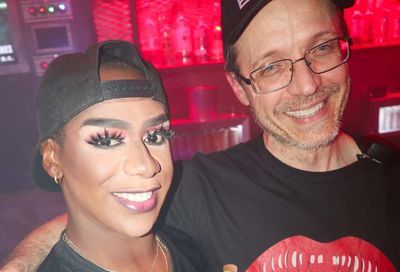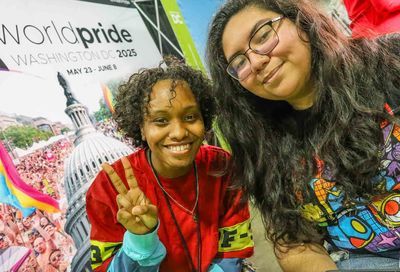Don’t Just March… Run!
This Pride season, we need to persuade our LGBTQ friends and family to run for office

When Jolie Justus became the first openly LGBTQ person to be elected to the Missouri State Senate 10 years ago, it was groundbreaking. The state had been shifting from blue to purple and then red, and she entered a state legislature dominated by conservatives. Many of these legislators were outspoken on their opposition to equality for LGBTQ people. Some even questioned the community’s right to live openly and free. But Jolie walked into the state capitol undaunted — confident she could improve the lives of her constituents while also standing for LGBTQ equality when her colleagues threatened its advancement.
Jolie became the voice for LGBTQ people in the state legislature, while building relationships with colleagues on both sides of the aisle. And she used these relationships to make positive change. She teamed up with a Republican state senator to push forward a non-discrimination bill protecting LGBTQ people — and lobbied her colleagues to support it. When the final votes were tallied, Jolie had secured the support of nine additional Republicans — an extraordinary feat — giving it just enough votes to pass.
An analysis of the seating chart and voting record that day reveals a fascinating but unsurprising pattern. Nearly all the Republican legislators that supported the protections were those seated next to Jolie in the senate chamber. Jolie had become a respected colleague to those senators, humanizing the lives of LGBTQ people for lawmakers who may never have knowingly interacted with an openly LGBTQ person before. To vote against protections for an abstract community was one thing, but it was much more difficult voting against discrimination protections for Jolie and her wife, Shonda.
LGBTQ representation in government matters, because representation is power. LGBTQ elected officials impact legislation, change the tone of debates, and persuade straight lawmaker colleagues to support equality. A recent Victory Institute study shows 70% of straight state legislators report that their LGBTQ colleagues strongly influenced their decision to vote for a pro-LGBTQ bill. LGBTQ elected officials are difference-makers, and play an essential role in moving equality forward.
And these leaders can play defense as well. The presidential election has emboldened our opponents — the attacks on our community in state legislatures are relentless. Hundreds of anti-LGBTQ bills have been introduced in the last year alone. But these anti-equality bills are almost entirely concentrated in state legislatures where there are few or no openly LGBTQ state legislators. When LGBTQ lawmakers are at the table, our community is significantly less likely to come under attack.
Yet the reality is there are far too few LGBTQ lawmakers at the table. LGBTQ Americans are still severely underrepresented in government, making up a small fraction of one percent of all elected public positions. There are just six openly trans people serving in elected office nationwide. To advance equality for LGBTQ people in every state, blue or red, we need to invest in a new generation of LGBTQ leaders to run for office in their home cities and states, so they can be the next Jolie and a voice for our people.
So this Pride season — whether celebrating or resisting — we need to persuade our LGBTQ friends and family to run for office. Being a politician is not sexy right now, and running is no easy task, but we all know the people in our lives who have the skills and grit and determination to make it happen. And they can start local. It is the school board members who eventually run for city councils, and the city council members who become state legislators and members of Congress. Few people run for office without being asked multiple times by multiple people, so commit yourself to making the ask. Or consider running yourself.
LGBTQ elected leaders are the antidote to the anti-equality efforts we see at every level of government. So tell your loved ones this weekend: Don’t just march… RUN!
Aisha C. Moodie-Mills is the President & CEO of Victory Institute, the only national organization that works to increase the number of LGBTQ people in public office by training leaders to run for office, and then supporting them when in office to ensure their success. Learn more at victoryinstitute.org.
Forum is open to all opinions. For guidelines on how to contribute in print and online, send an email to editor@metroweekly.com.
Support Metro Weekly’s Journalism
These are challenging times for news organizations. And yet it’s crucial we stay active and provide vital resources and information to both our local readers and the world. So won’t you please take a moment and consider supporting Metro Weekly with a membership? For as little as $5 a month, you can help ensure Metro Weekly magazine and MetroWeekly.com remain free, viable resources as we provide the best, most diverse, culturally-resonant LGBTQ coverage in both the D.C. region and around the world. Memberships come with exclusive perks and discounts, your own personal digital delivery of each week’s magazine (and an archive), access to our Member's Lounge when it launches this fall, and exclusive members-only items like Metro Weekly Membership Mugs and Tote Bags! Check out all our membership levels here and please join us today!






















You must be logged in to post a comment.